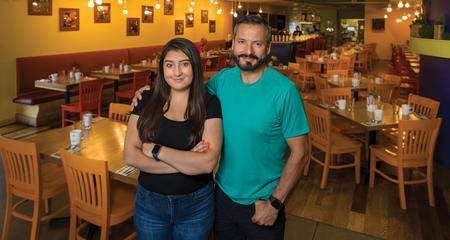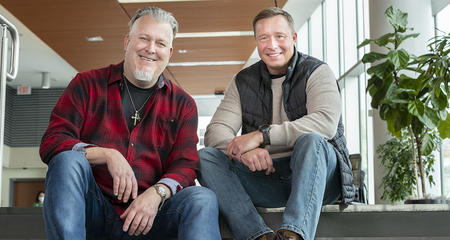After his second heart attack in July 2002, Hank Sibbing, then 59, developed severe congestive heart failure. His damaged heart could not pump sufficient blood, and breathing was so hard that he could not sleep. He visited his cardiologist, who was alarmed by Hank’s obvious poor health. “She said, ‘I’m sending you to Froedtert Hospital right now,’” Hank remembered.
When Hank arrived with his wife, Mary, at Froedtert Hospital, the heart transplant coordinator met them at the door. The transplant team immediately added Hank to the list of people eligible for an organ transplant and admitted him to the hospital so he could receive intravenous medication for heart failure.
 Waiting for a Heart Transplant
Waiting for a Heart Transplant
His doctors explained that Hank was too sick to return home and needed to remain in the hospital until a donor heart was available. Hank, an attorney who works as both a municipal judge and mental health counselor in Lake Geneva, says the wait was difficult. But he developed close friendships with nurses and other Froedtert Hospital staff who worked hard to keep him comfortable.
One evening about six weeks after he arrived at the hospital, Hank was about to eat dinner when a nurse rushed into his room. A donor heart was available. “It was very exciting,” Hank remembers. “I was so sick of being sick.” Later that evening, his surgeon performed the transplant surgery, which took roughly eight hours. He had an additional surgery the next day to repair a hemorrhaging blood vessel, a complication that can arise after transplant surgery.
The Sibbing family was overjoyed about Hank’s new heart but also sobered by the tremendous gift shared by the heart donor. They remain grateful. “Every year on the anniversary of the heart transplant, we think about the family that donated to us,” Mary said.
Heart Transplant Recovery
Within days of his surgery, Hank began to work with physical therapists to regain his strength. He was discharged 12 days later, and the rehab continued at home. Eventually he switched to outpatient rehab at a local hospital in Lake Geneva.
“It was a long, slow recovery,” Hank remembered. One year after the transplant he felt very fatigued and struggled with swelling in his hands and feet. During a follow-up appointment at Froedtert Hospital, his medical team diagnosed him with constrictive pericarditis, an uncommon side effect of heart surgery in which the pericardium or sac around the heart thickens and tightens, strangling the heart muscle. Hank returned to the operating room, where his heart surgeon successfully removed the remaining layers of pericardium from the heart, freeing this muscle to beat normally.
Monitoring Heart Transplant Patients
Heart transplant patients at Froedtert Hospital receive close monitoring after the transplant is complete. “In the first year we see them 16 times at least, because that’s when they are at highest risk for infection and rejection,” said Nunzio Gaglianello, MD, advanced heart failure and transplant cardiologist, and Hank’s current cardiologist.
Rejection is the condition in which the body’s immune system begins to attack the transplanted organ. “A lot of rejection episodes are asymptomatic,” said Ronald Siegel, MD, Hank’s cardiologist for many years. “The only way you know about them is routine surveillance biopsies.” Transplant patients also face an increased risk of certain cancers caused by the antirejection medications they take.
Indeed, Hank was diagnosed with post-transplant lymphoproliferative disorder (PTLD), a form of cancer common in transplant patients. He was successfully treated by oncologist Timothy Fenske, MD, MS, and is monitored regularly by dermatologist Marcy Neuburg, MD. Skin cancers are another common side effect of antirejection medication.
Several years ago, Hank also developed severe and perplexing gastrointestinal symptoms. He recalls visiting his cardiologist, Dr. Siegel, because he had lost too much weight. Dr. Siegel began sifting through research and found a small European study that showed that Hank’s antirejection drug could in rare cases damage the intestines. Hank immediately began a new medication. He raves about Dr. Siegel’s expertise and about how fast he improved when on the new medicine.
Supporting Heart Transplant Patients and their Families
Two years ago, Froedtert Hospital staff invited Hank and Mary to join the Patient Advisory Council, a patient group that meets monthly to talk with hospital staff about ways to improve the patient experience. “We even talk about things like one-way streets [on the hospital campus] that cause people problems,” Hank said. “We brought up the traffic issue and they fixed it.” Hank is passionate about making Froedtert Hospital the best place to receive care.
Hank is also committed to advocating for the needs of families while their loved ones receive care. “I could not have done this without my wife,” Hank said. Mary added that she has had terrific support at Froedtert Hospital, particularly when Hank was waiting for his transplant. “They really accommodated us as a family,” she said. “They were welcoming and understanding that our son Beau, who was 16 at the time, wanted to spend time with his dad.” Mary and Hank add that they are grateful for the transplant coordinators, especially Jan Schweiger, now retired, who was highly organized, compassionate, and helped arrange many aspects of Hank’s care.
Now, more than a decade after his transplant, Hank is thriving. In addition to his judgeship and work as mental health counselor, and his volunteer role at Froedtert Hospital, he loves to golf and fish as often as he can. “Froedtert Hospital’s fixed me quite a few times,” he said. “I’ve gotten unbelievable care, and I’ve made tremendous friends.”


